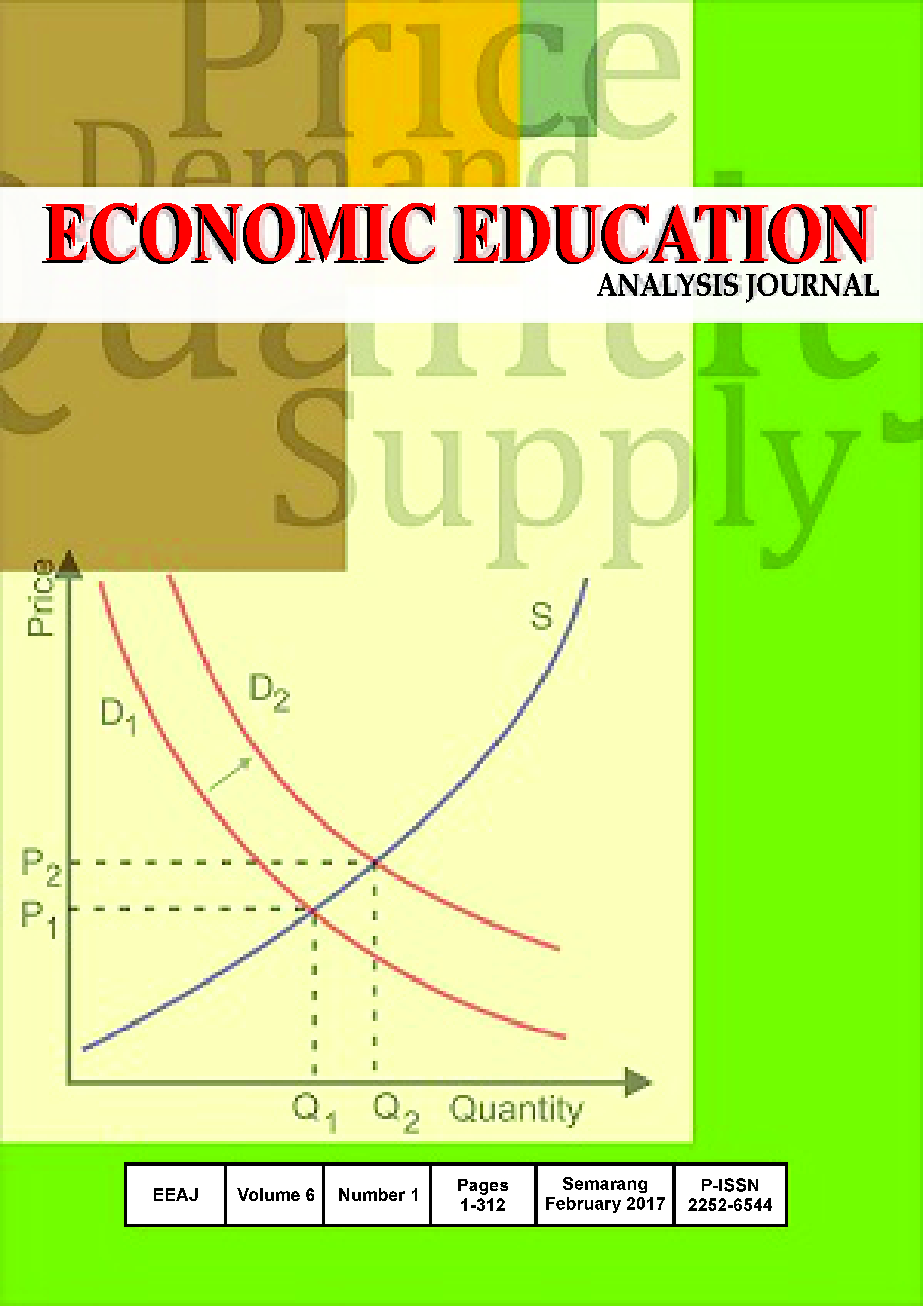FAKTOR-FAKTOR YANG MEMPENGARUHI HASIL BELAJAR MATA PELAJARAN IPS EKONOMI SISWA KELAS VIII SMP NEGERI 5 BATANG (Tahun Ajaran 2015/2016)
Main Article Content
Abstract
Belajar mata pelajaran ekonomi dipengaruhi oleh faktor internal dan faktor eksternal. Penelitian ini dilatar belakangi dari hasil observasi yang menunjukan masih terdapat siswa yang memperoleh nilai hasil belajar ekonomi dibawah nilai KKM yang telah ditetapkan yaitu 67. Berdasarkan nilai hasil belajar ekonomi semester gasal siswa kelas VIIISMP 5 Batang tahun ajaran 2014/2015, dari 244 siswa terdapat 122 (50%) siswa memperoleh nilai dibawah KKM. Penelitian ini bertujuan untuk mengetahui dan menganalisa faktor-faktor apa saja yang mempengaruhi hasil belajar siswa pada mata pelajaran akuntansi siswa kelas VIII SMP 5 Batang. Hasil penelitian menunjukan terdapat 5 (lima) faktor yang mempengaruhi hasil belajar siswa yaitu (1) faktor psikologi siswa yang terdiri dari: Bakat, Kesiapan, Kematangan, Pehatian, Intelegensi, Minat, dan Motivasi. (2) faktor lingkungan masyarakat yang terdiri dari: Kegiatan siswa dalam masyarakat, Teman bergaul, Mass media. (3) faktor kondisi belajar siswa terdiri dari: Metode belajar, Alat pelajaran. (4) faktor lingkungan sekolah yang terdiri dari: Keadaan gedung, Metode mengajar guru, Relasi guru dengan siswa, relasi siswa dengan siswa. (5) faktor lingkungan keluarga yang terdiri dari: Cara orang tua mendidik, dan Relasi antar anggota keluarga. Dari hasil penelitian ini dapat disimpulkan bahwa faktor psikologi berpengaruh sangat tinggi terhadap hasil belajar dan faktor keadaan ekonomi berpengaruh rendah, saran yang diberikan dalam penelitian ini yaitu siswa diharapkan tidak menuntut orangtua untuk mencukupi kebutuhan yang tidak mendukung belajarnya akan tetapi memaksimalkan kondisi belajarnya dengan memanfaatkan sumber belajar yang ada seperti memanfaatkan perpustakan sebagai media belajar supaya semakin termotivasi dan tekun dalam belajar. Dan orang tua hendaknya tidak hanya memenuhi kebutuhan ekonomi semata akan tetapi lebih kepada pendekatan siswa dengan cara siswa lebih diperhatikan supaya hasil belajarnya meningkat.
The results of the economic study subjects are influenced by internal factors and external factors. The background of this research from the observation that shows there are students who obtain economic value of learning outcomes under KKM predetermined value is 67. Based on the results of the economic study odd semester grade students VIIISMP 5 Batang academic year 2014/2015, there were 122 students out of 244 (50%) of students scored below the KKM. This study aims to identify and analyze the factors that influence student learning outcomes in accounting subjects eighth grade students of SMP 5 Rod. The results showed there were five (5) factors that affect student learning outcomes, namely (1) the factors psychology students consisting of: Talent, Readiness, Maturity, pehatian, intelligence, interest, and motivation. (2) environmental factors society consisting of: Student activities in the community, friends get along, Mass media. (3) factors of student learning conditions consist of: Methods of learning, teaching tool. (4) The school environment factors consist of: The state of the building, teachers' teaching methods, teacher relations with students, student relationships with students. (5) environmental factors family that consists of: How to educate parents, and the relationship between family members. And parents should not only meet the needs of the economy alone but rather to approach students with a more considered way so that students learning results increased. It is suggested that teachers are expected to take appropriate and timely policies so that student learning outcomes can be improved.
